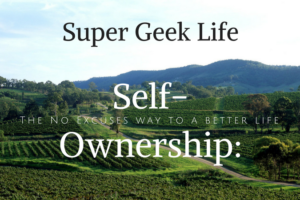Product Management When the Product is You
One of the most interesting roles to develop recently is the role of product management. There have been people with the title product manager before of course. Its current incarnation though, has only been around for about the last 10-15 years.
What does a Product Manager do?
What is my definition of a product manager? To me it is a person that leads cross functional teams. This role is one that enables and empowers others to do their best work. A product manager removes the stops so that the members of the team can reach their fullest potential.
This is all done in the name of developing a great product (whatever it may be). Product managers steer the team along the roadmap (while simultaneously creating it). They put the train on the tracks and let it go. They are the gentle hand that nudges it back onto the track if it comes loose.
In the sense of today’s modern products the product manager is a jack of all trades with a few specializations. They can manage projects (usually in an agile framework). If the product is digital they can speak the language of code (at least enough to get the overview from the engineers). Product managers also understand the data. They are connected in a constant feedback loop by which customers, members of the team, leaders (all other stakeholders), and news from the market will help to steer the direction of the ship.
The product manager may have control over an entire product or a small feature of it depending on the scope. They may have absolute authority, or they (more usually) act as an informed intermediary.
Failing Fast
One of the most important things a product manager can do for a company though is fail. I don’t mean fail the product or trash the company. The thing is that failing is inevitable in a company. As a product manager you want to make sure that you do it quickly and on a small scale.
The idea is to take your biggest assumptions and put them through tests that are measurable. They also push to churn out minimum viable products (MVPs) to aid in this.
Resources are limited and time is valuable so the biggest tragedy for a company would be to sink resources into a product that will ultimately fail later. So fail often and early by testing your building blocks BEFORE building the big project.
This is the basic point in the well-known book “The Lean Startup” by Eric Ries. I recommend that everyone read this book that has any aspirations of building their own business or product. I recommend reading it if you have any aspirations to do anything. It has become a pivotal philosophy used in startup culture and in the world of product management.
How do you learn more about product management?
In the traditional startup sense the best way would be to get yourself knowledge in a bit of everything that you might need. This would include things like basic business analysis, market research, marketing, data science, coding, web development generally, design, or project management just to name a few. These skills are some of the cornerstones to product management in the typical sense.
I’ve written a few articles on the possibilities and resources available to learn a lot of this on your own. These days you can learn almost anything, anywhere (and often times for free). Udemy, Hubspot Academy, Khan Academy, code academy, google, and a host of other resources are at your fingertips.
Assuming you have a few of these skills, I’ve written a high level overview on what typical product management might look like. It’s the sort of thing I wish I had starting out. Of course each topic in and of itself within the pages could be a book unto itself these days. Download it here.
Why am I writing an article about product management on Super Geek Life?
This topic may seem like it is out of left field for this site. I wanted to write about it because it is espoused in everything I do. In my day job I’ve seen over 300 products at varying levels of success from inception to shipment (software and manufacturables). Recently though I use the same principles for developing this site. Additionally I use the same principles for developing myself. It goes without saying that product management permeates through the whole thing.
What’s a product anyway?
A product in the sense of a product manager can be anything. It doesn’t have to be a web page or a piece of software as it is typically thought of. It can be a creative endeavor. It can be the book that you are writing. Upon reading “Perennial Seller” by Ryan Holiday, I had a eureka moment (hand wrapped from its pages) that creative projects/products are no different than business products (that is not to say that many business products are not creative).
In fact you’re more likely to be successful if you use a little business acumen in your creative products/projects. This is true even if the project is only something for you. These are the same principles that are pointed out in “The Lean Startup”. The idea that you should test your biggest assumptions first in order to fail fast and frequently in the beginning in order to succeed more later on. Holiday illustrates this notion in a crystal clear fashion. If you are a creative with ambitious goals for your work I recommend reading Holiday’s book.
The principles work in more than just business
What’s more is that after these principles were pointed out I realized that you could extrapolate these principles towards anything. This includes yourself. It also includes working out or taking up new hobbies. Test your assumptions. With hobbies this could be placing yourself in the situation that makes you feel most uneasy early on. In this way, you’d be able to figure out whether it was truly overwhelming for you or whether you could deal with it.
Using this principle might mean getting more feedback before committing to something if you are typically impulsive. It might mean demanding a trial period on something before signing a contract. Using these principles has the potential to save you money personally and allow you to succeed more efficiently. They could also help you to find out what you actually like rather than forcing yourself into something.
I’m not saying that a bit of impulsiveness or playing the wild card isn’t a good thing every now and again. I am saying that for long term things or financial commitments, learning to test your assumptions is key.
The product can be you
At any rate, whether you take these product management principles to your work, or to your personal/creative endeavors there is something to be gained. My biggest takeaway is that I at one point in my life had them in very secular containers in my mind. The closer I get to seeing the matrix though, the more the lines blur and I see that they are not mutually exclusive.










